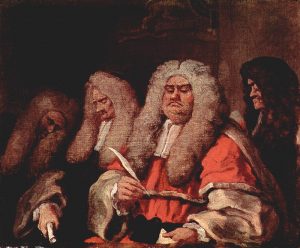Illuminations on the Lectionary readings for Oct. 19, 2025 (Pentecost 19C/Proper 24)

The Bench (1758), oil painting on canvas by William Hogarth (1697-1764). Fitzwilliam Museum, Cambridge. (Click image to enlarge.)
First Reading (Track One): Jeremiah 31:27-34
Place your hope in God; and even in the face of challenges, be persistent: Listen for this consistent theme through Sunday’s readings. In this first reading, the Prophet Jeremiah pauses his nearly relentless lamentation over the sins that led Israel and Judah into exile, offering instead a few words of hope and the certainty of God’s love. Using a colorful metaphor about the sharp taste of sour grapes, Jeremiah makes clear that the people fully deserved the hard times that they are suffering. But, the prophet foretells, God will forgive them, offer a new covenant, and return them home, just as their ancestors came out of slavery in Egypt.
First Reading (Track Two): Genesis 32:22-31
Ideas about hope in God and persistence in the face of challenges recur in Sunday’s readings. In this strange narrative from Genesis, Jacob wrestles all night with an unknown who doesn’t fight quite fairly. He knocks Jacob’s hip out of joint with a sneaky blow, but Jacob won’t give up. He fights the stranger to a standstill, then refuses to let him go without disclosing his name. This adversary turns out to be God, who thereupon changes Jacob’s name to Israel and blesses him.
Psalm (Track One): Psalm 119:97-104
The longest of all the Psalms, Psalm 119 devotes all of its 176 verses to a long, loving celebration of the Torah, the first five books of the Hebrew Bible. The ancients understood Torah as God’s “teaching,” but in English Bibles it is usually translated as “Law,” a word that we may read with a different connotation. Think of love for God’s word and get a clearer sense of the people’s patient, persistent efforts to study and learn until God’s teachings are written on their hearts in words as sweet as honey.
Psalm (Track Two): Psalm 121
This ancient hymn is one of the traditional songs of ascents thought to have been chanted by worshippers as they processed toward the Temple in Jerusalem. Its assurance of God’s protection as we lift up our eyes to the hills, seeking from where our help is to come, makes it one of the most comforting psalms of hope and trust. Always awake, always watchful, God protects us by day and night, watching us come and go, keeping us safe today and forever.
Second Reading: 2 Timothy 3:14-4:5
“All scripture is inspired by God and is useful for teaching, for reproof, for correction, and for training in righteousness. … convince, rebuke, and encourage, with the utmost patience in teaching.” No, this reading does not call us to be Bible thumpers, lecturing unbelievers and rebuking them if they won’t listen. This letter was written in Paul’s name at a time when the young church was fighting persecution. Rather than giving up, the writer advises the troubled flock to learn scripture and be persistent about proclaiming the kingdom of God in the name of Jesus, because proclaiming the kingdom was as important as life and death.
Gospel: Luke 18:1-8
In the patriarchal world of the ancient Near East, widows were helpless, vulnerable, and weak. But now, in Jesus’s parable of the persistent widow, we meet one who is tough as nails and won’t give up. She doesn’t quit pounding this corrupt and shiftless judge with her demands until he finally gives her the justice that she seeks. The message here is clear, as Jesus declares at the beginning and the end of this Gospel story: Pray always and do not lose heart. God will grant justice to the chosen ones who pray by day and night.
